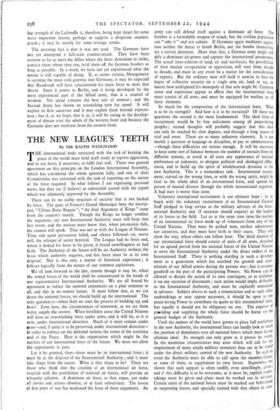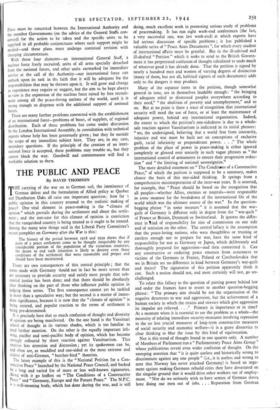THE NEW LEAGUE'S TEETH
By SIR RALPH WEDGWOOD
THE international body entrusted with the task of keeping the peace of the world must hold itself ready to repress aggression, and to use force, if necessary, to fulfil that task. There was general agreement on this principle on the London International Assembly, which has considered the whole question fully, and one of their Commissions was entrusted with the task of reporting on the nature of the force required. In what follows I am expressing personal views, but they are (I believe) in substantial accord with the report which was ultimately approved by the Assembly.
There can be no stable structure of security that is not backed by force. The guns of France's Grand Monarque bore the inscrip- tion " Uhima Ratio Regum "; " the final Argument of Kings " came from the cannon's mouth. Though the Kings no longer conduct the argument, our new International Authority must still keep that last resort, and the nations must know that, when persuasion fails, the cannon will speak. That was not so with the League of Nations. Time and again persuasion failed, and silence followed—or, worse still, the whisper of secret betrayal. The League had no force and, where it looked for force to be given, it found unwillingness or bad faith. The Authority of the future will be no Authority without the force which authority requires, and this force must be at its own disposal. Nor is this only a matter of historical experience ; it follows logically from the nature of our common aspirations.
We all look forward to the day, remote though it may be, when the armed forces of the world shall be concentrated in the hands of one representative International Authority. We are all bound by agreement to reduce the national armaments on a plan common to all, and this in no remote future. It must follow that, as we cut down the national forces, we should build up the international The only question is—when shall we start the process of building up, and how? Even here, the circumstances of tomorrow, as we see them today, supply the answer. When hostilities cease the United Nations will have an overwhelmig force under arms, and it will be, as it is now, under international direction. Much of it must remain under arms—and, if unity is to be preserved, under international direction— in order to enforce on the defeated nations the terms of the armistice and of the Peace. Here is the organisation which might be the nucleus of our international force of the future. We must not allow the opportunity to pass.
Let it be granted, then—there must be an international force ; it must be at the disposal of the International Authority ; and it must take shape from the outset. What is that shape to be? There are those who think that the creation of an international air force, coupled with the prohibition of national air forces, will provide an adequate solution. A dominant air force, so they argue, can make all navies and armies obsolete, or at least subservient. The lesson of five years of war has weakened the force of these arguments. An
army can still defend itself against a dominant air force. The bomber is a formidable weapon of attack, but the civilian population can " take it " and not submit. If Germany again meditates aggres- sion neither the threat to bomb Berlin, nor the bombs themselves, are a certain deterrent. More than that, a German army might still defy a dominant air-power and capture the international aerodromes. The actual inter-relation of land, air and sea-forces, the possibilities of their mutual co-operation or opposition, will vary from decade to decade, and must in any event be a matter for the consideration of experts. But the ordinary man will hold it unwise to base his hopes of collective security on a single arm, air, land or sea, no matter how undisputed his monopoly of that arm might be. Common sense and experience appear to affirm that the international force must consist of all arms, and must be equipped for warfare on all three elements.
So much for the composition of the international force. What is to be its strength? And how is it to be recruited? Of these two
questions the second is the more fundamental. The ideal form of recruitment would be by free enlistment among all peace-loving peoples ; second thoughts will probably suggest that this ideal can only be reached by slow degrees, and through a long course of trial and error. There are so many unknown elements. It is not merely a question of language or discipline, of pay or administration —though these difficulties are serious enough. It will be necessary to keep some sort of balance between the number of recruits firm the different nations, to avoid at all costs any appearance of national preferences or jealousies, to mitigate political and ideological differ- ences, and to build up the spirit of wholehearted devotion to the new Authority. This is a tremendous task. International recruit- ment, started on the wrong lines, or with the wrong. spirit, might be fatal to the whole ideal of an international force, and spread the poison of mutual distrust through the whole international organism. A bad start is worse than none.
Voluntary international recruitment is our ultimate hope : let us begin with the voluntary recruitment of an International Genera] Staff pledged to long service as the military advisers of the Inter- national Authority and (if occasion should require) as the leaders of its forces in the field. Let us at the same time raise the nucleus of an international air force made up of volunteers from any of the United Nations. They must be picked men, neither adventurers nor careerists, and they must have faith in their cause. They will show the way, where others can follow later. The third element of our international force should consist of units of all arms, detached for an agreed period from the national forces of the United Nations to serve the International Authority under the direct orders of the International Staff. There is nothing sthrtling in such a develop- ment to a generation which has watched the growth and inter- mixture of our Allied armies during the present war ; but it assumes goodwill on the part of the participating Powers. No Power can be allowed to dictate the action of its own contingent, or to withdraw it on any occasion of discontent ; such action would imply disloyalty to the International Authority, and must be explicitly renounced in advance. Subject always to such a renunciation and to such other undertakings as may appear necessary, it should be open to anY peace-loving Power to contribute its quota to this international force, but equally it should not be obligatory on any. The expense of providing and supplying the whole force should be borne on the general budget of the Authority. Until the nations of the world have grown to place full confidence in the new Authority, the international force can hardly look to reach the position of dominance over all national forces which must be our ultimate ideal. Its strength can only grow as it proves its worth. In the meantime circumstances may arise which will call for the employment of more ample military resources than are to be found under the direct military control of the new Authority. In such an event the Authority must be able to call upon the member-States, or some of them, to supplement its own forces. Experience ho shown that such support is often tardily, even unwillingly, given; and if this difficulty is to be overcome, as it must be, explicit under- takings must be given and plans must be worked out in advance. Certain units of the national forces must be marked out beforehand as supporting forces, and specially trained -with that object in view. Plans must be concerted between the International Authority and the member Governments (on the advice of the General Staffs con- cerned) for the action to be taken and the specific units to be supplied in all probable conjunctures where such support might be needed—and these plans must undergo continual revision with changing circumstances.
With these four elements—an international General Staff, a nucleus force freely recruited, units of all arms specially detached from the national forces, and other units earmarked for immediate service at the call of the Authority—our international force can embark upon its task in the faith that it will be adequate for the responsibilities that may be thrown upon it. It will grow and change as experience may require or suggest, but the aim to be kept always in view is the expansion of the nucleus force raised by free recruit- ment among all the peace-loving nations of the world, until it is strong enough to dispense with the additional support of national forces.
There are many further problems connected with the establishment of an international force—problems of bases, of supplies, of regional distribution. Each of these problems has come under discussion by the London International Assembly, in consultation with technical experts whose help has been generously given ; but they lie outside the scope of my immediate subject here. They are, in any case, secondary questions. If the principle of the creation of an inter- national force is accepted, these problems may trouble us, but they cannot block the way. Goodwill and commonsense will find a workable solution to them.



























 Previous page
Previous page